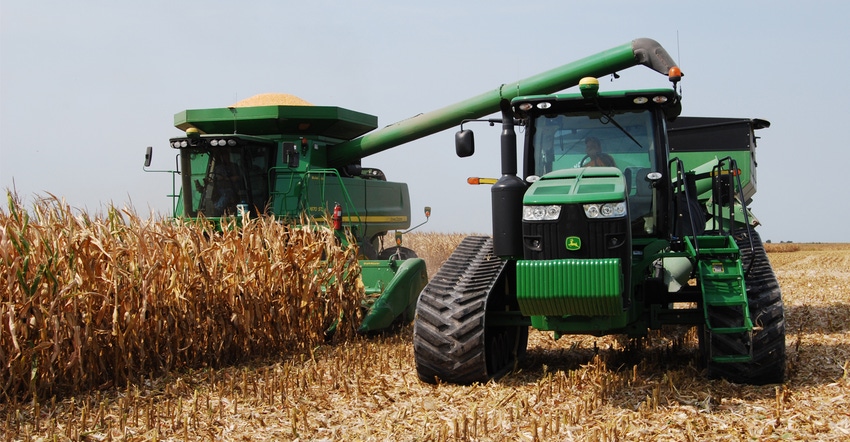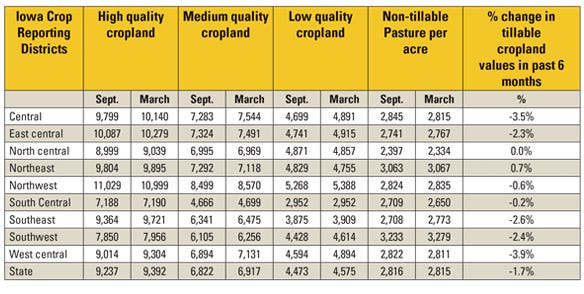
The average value of Iowa cropland declined 1.7% from March to September, according to the latest survey by the Realtors Land Institute, Iowa Chapter. Tariffs and depressed commodity prices are blamed. Combining this decrease with the 2.9% increase reported in March indicates a statewide average increase of 1.2% from September 2017 to September 2018.
The average farmland value is now $6,844 for Iowa, says Kyle Hansen, a real estate agent with Hertz Real Estate Services. He oversees the twice-per-year survey. Results for the most recent 12-month period were mixed. There’s been only a limited supply of farmland offered for sale, which is stabilizing values. The Realtors group surveys farm specialists in land sales, farm management and appraisals about farmland values.
6-month winners and losers
Only northeast Iowa had an increase in farmland values, climbing 0.7% from March to September. North-central Iowa had no change. All seven of the other crop reporting districts posted losses, with the greatest decline in west-central Iowa, falling 3.9%. Central Iowa saw land values drop 3.5% over the past six months.
Iowa’s most expensive farmland is in northwest Iowa; high-quality land is valued at $11,029 per acre. The best deal on high-quality land is in south-central Iowa at $7,188 per acre. The most expensive timberland, preferred by hunters and conservationists, is in south-central at $2,979 per acre. Cheapest is in north-central at $2,074 an acre.
The reason most often cited for lower land prices the past six months is the trade dispute between U.S. and foreign buyers. Tariffs driving commodity prices lower, along with uncertainty about world trade agreements and higher interest rates, are key reasons for falling farmland values.

Survey of Iowa farmland values (dollars per acre) for September. Land in the survey is classified by potential for corn production: high, medium and low quality.

Future uncertain
Where will land values go from here? The future is more uncertain than ever. Land values collapsed in the 1980s, bottoming out in 1987. They rose, climbing dramatically after 2000, and peaked four years ago. They’ve declined mildly for three years. “Now, the market is trying to figure out if it has bottomed or if it will drop further,” Hansen says.
Commodity prices have fallen four years, and the outlook isn’t rosy. The trade war initiated by President Donald Trump has further dampened both prices and the mood of farmers. The trade war is one of the major factors behind the drop in land sales the past few months.
The land market depends greatly on location and availability of land for sale. In some areas prices are falling; in others, there may be good demand for a specific farm. The Realtor’s survey says it looks likely more land will sell in coming months, with some owners deciding the market has peaked.
That doesn’t mean farmers are being forced to sell by bankers. That may happen in some cases, but most sales are still being made by estates and off-farm heirs, some of whom may be deciding now is a good time to get out of owning farmland.
About the Author(s)
You May Also Like




